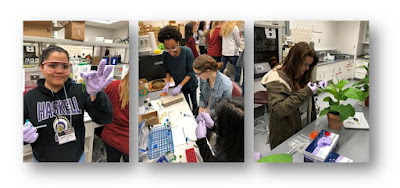 |
| Carrie Spanton |
This summer the
Kansas NSF EPSCoR OIA-1656006 RII Track-1: Microbiomes of Aquatic, Plant, and Soil Systems across Kansas (MAPS) and the
Department of Ecology & Evolutionary Biology (EEB): Research Experience for Undergraduates (REU) program at the University of Kansas (KU) have partnered to support three summer REU students. Through this collaboration, Carrie Spanton has been working with MAPS researcher,
Terry Loecke on a project titled
The effect of climate and land use on methanotrophic communities.
Carrie is not your typical summer REU student. She grew up in Kentucky and lived in New Orleans for 20 years. She was living in New Orleans when hurricane Katrina hit in 2005. For Carrie, the hurricane was a trans-formative event and heavily influenced her decision to go back to school. Because the hurricane had stripped away everything she had once known and possessed, it left her thinking, "who am I?" All the things she thought defined her were suddenly gone. Although the hurricane experience was devastating, she said “It was really liberating” too, because the ordeal gave her a chance to rediscover herself and the “guts to go back to school.”
Kansas City is now Carrie's home, and she attends
Metropolitan Community College at Penn Valley (MCCKC). In addition to her studies, she is the president of
Phi Theta Kappa, a prestigious honor society for two-year college students, and has been involved in the MCCKC
Women on the Move program. She is also a Supplemental Instructor for an Ancient History/Biology community learning class, an active member of
Project Success, a weekly volunteer at the food pantry, and a volunteer at North Kansas City Hospital Hospice. Carrie stays active in student government and plans to start tutoring in the fall. Biology and Environmental Science became a focal interest for Carrie after she met her MCCKC mentor and biology instructor,
Terry Davin. It was his teaching style that encouraged her to become a scientist and to apply for the KU summer EEB REU program.
 |
| Samples from the research |
As an EBB REU participant, Carrie has felt a sense of community with her cohort and has especially loved learning "how to conduct research." Learning research methodology from her REU mentor, Terry Loecke, she says, "has been life-changing." Carrie describes their REU research project as follows: "As global temperatures and net population simultaneously rise, so does the demand for food production. The overall impacts of different land use management practices on the net global warming potential remain largely unknown. Methane is a critical greenhouse gas that is both emitted and consumed by microbial communities in soil, contributing to climate change. We used a full fractal design experiment to measure how soil moisture and the addition of nitrogen, which is widely used as fertilizer, effect methane oxidation (consumption) in soils. We used soil samples from east and west Kansas of agricultural land, post-agricultural land, and native prairie land to add varying moisture and nitrogen treatments. We added methane to these treatments then took four samples sets at varying times."
According to Carrie, this REU experience has positively "pushed her out of her comfort zone." She has loved learning new things and “how to think like a scientist.” She further commented, “I have watched my skill sets grow.... As a non-traditional student, I didn't know what I was capable of when I first started school. Having this kind of support as I grow as a professional has been life-changing. I have learned that I can, actually, really do this.” On a more personable note, she says her favorite part of this summer experience has been "showing my 16-year-old son what kind of opportunities are out there and getting him excited about his future. He's my inspiration and my drive.” As for her future plans, Carrie plans on continuing her studies and staying in academia. This experience has also taught her what kind of “mentor/leader/researcher/instructor" she would like to be one day, and she hopes "to pass on this gift that others have given" to her.
Workforce Development, Education and Outreach funding for the Summer MAPS EEB REU program is provided by the Kansas NSF EPSCoR RII Track-1 Award OIA-1656006 titled: "Microbiomes of Aquatic, Plant, and Soil Systems across Kansas." The grant's workforce development and educational objectives are designed to enhance STEM education in Kansas by supporting activities that will lead to an expanded STEM workforce or prepare a new generation for STEM careers in the areas of aquatic, plant and soil microbiome environments and ecological systems.








